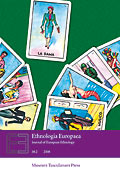 |
|

|
Boginfo |
|
| |
|
|
|
|
Museum Tusculanums Forlag bruger cookies for at huske dine indstillinger. Ved at bruge sitet accepterer du dette. Accepter cookies
|
| |
 Nyhedsbrev Nyhedsbrev
 Print siden Print siden
|
|

|
|
|
 Indholdsfortegnelse Indholdsfortegnelse
▼ e-Tidsskriftsartikler
▼ Din mening
▼ Kunder, som har købt denne titel, købte også
Fås også som trykt tidsskrift
Identity politics have been a focus of academic research over the
last years, but they have also entered public and popular discourses
and thus continue to fuel changing intellectual perspectives as
much as everyday life. The present issue of Ethnologia Europaea assembles
a number of papers that examine identity work in different
settings.
What are the lasting assets and the changing risks of this
concept, in both social life and ethnological analysis?
Søren Christensen discusses ways in which the global and the
national are linked in Danish politics and in the nation-branding
of Danishness as a global export commodity.
Rob van Ginkel looks at the identity politics of folk dancing
and debates of authenticity versus cosmopolitanism in the
Netherlands since the Second World War.
Sofi Gerber follows how East and West have been renegotiated
in Germany after 1989. The changing stereotypical
polarizations, in which the question of ‘the authentic’ becomes
a weapon, show – in a different time and place –
similarities to the battle over folk dancing.
Kira Kosnick takes the question of identity politics
to a club scene in Berlin. She discusses the ways in
which identity labeling of minorities may produce
a very one-dimensional understanding of the
workings of urban social life.
The politics of ageing is the theme for Lars-Eric
Jönsson’s contribution. How were labels of old age or childishness
handled in psychiatric institutions of the nineteenth and the
twentieth centuries?
Upcoming issues for 2009:
The first issue will center around the ‘sense of community’. How
might the community study approach be rejuvenated as scholars try
to tackle the ways in which the modern state and its welfare policies
materialize in local settings?
The second issue addresses questions of cultural property, as a
vital concern for actors concerned with the political, economic as
well as ethical dimensions of turning culture into a resource.
|
|
|
e-Tidsskriftsartikler
Indlæg offentliggøres med navn og e-mail. Forlaget forbeholder sig ret til at redigere og udelade indlæg.Kunder, som har købt denne titel, købte også
|
|
|
|
|
|
|
|
|
|
|